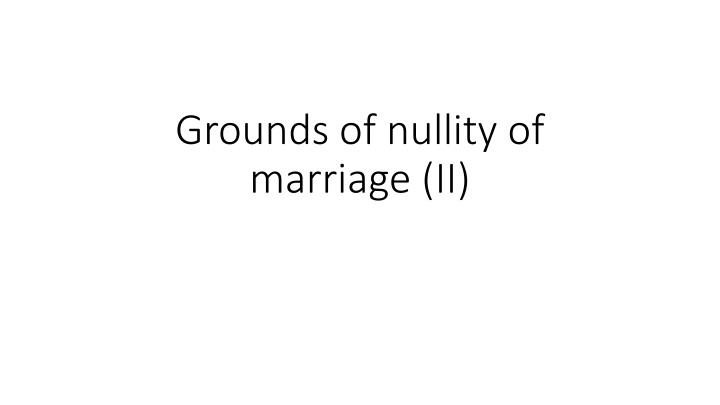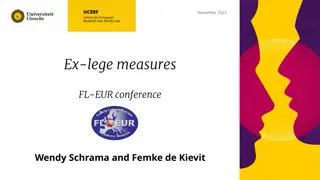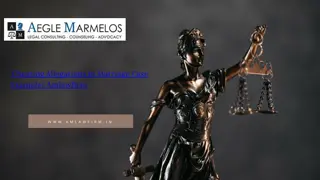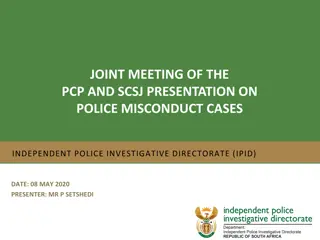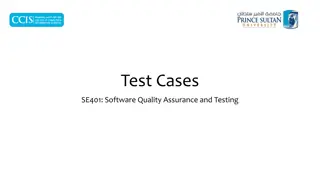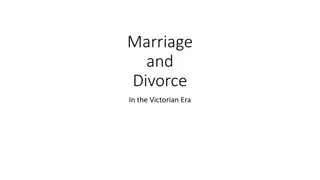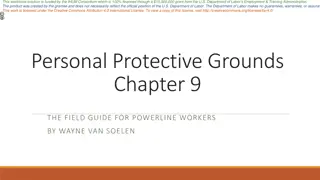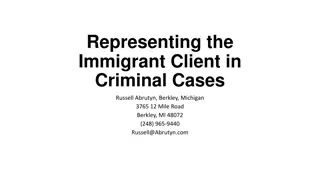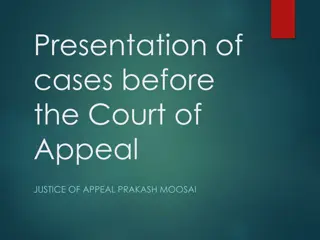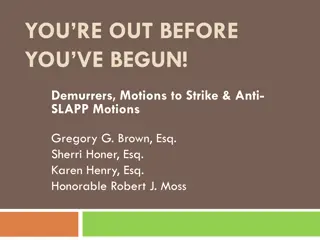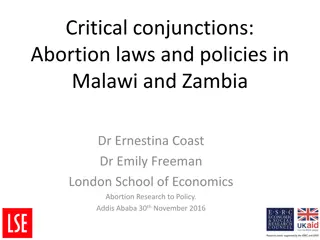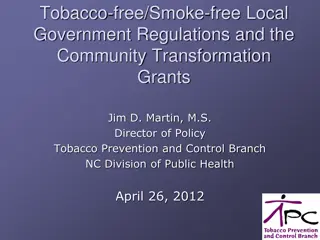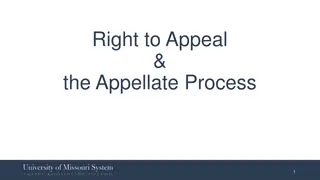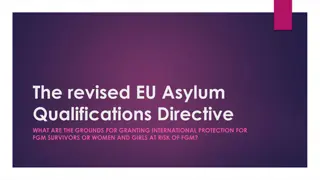Grounds of Nullity of Marriage and Incapacity in Marriage Cases
This content discusses various grounds for nullity of marriage, including lack of use of reason and incapacity as per Canon Law 1095. Case examples highlight situations where individuals were deemed incapable of contracting a valid marriage due to mental health issues or impaired judgment. The importance of understanding these grounds in marriage cases is emphasized, showcasing the complexity and depth of considerations in matrimonial matters.
Download Presentation

Please find below an Image/Link to download the presentation.
The content on the website is provided AS IS for your information and personal use only. It may not be sold, licensed, or shared on other websites without obtaining consent from the author.If you encounter any issues during the download, it is possible that the publisher has removed the file from their server.
You are allowed to download the files provided on this website for personal or commercial use, subject to the condition that they are used lawfully. All files are the property of their respective owners.
The content on the website is provided AS IS for your information and personal use only. It may not be sold, licensed, or shared on other websites without obtaining consent from the author.
E N D
Presentation Transcript
Grounds of nullity of marriage (II)
Grounds of nullity decided in the Diocese of Cleveland tribunal in formal cases, 2019-2021 450 400 350 300 250 200 150 406 100 57 35 75 21 15 25 50 3 1 5 3 2 1 0 In favor of the bond In favor of nullity
GLDJ IAEOM T Sim Sim children Sim fidelity Sim indissolubility Sim GS Other 406 57 15 75 35 212515
Incapacity Incapacity canon 1095 canon 1095 The following are incapable of contracting marriage: 1. those who lack the sufficient use of reason; 2. those who suffer from a grave defect of discretion of judgment concerning the essential matrimonial rights and duties mutually to be handed over and accepted; 3. those who are not able to assume the essential obligations of marriage for causes of a psychic nature.
Lack of use of reason (canon 1095, 1) Lack of use of reason (canon 1095, 1 ) - - 1 1 Becky has bipolar disorder with psychotic features. When she is in a manic phase and not taking her medication, she believes for several days at a time that she is a raven and that she can fly. When Becky is having these problems, her parents lock her in the family home to keep her safe. Becky is taking her medication in the months leading up to the wedding, and does not experience psychotic episodes around this time.
Lack of use of reason (canon 1095, 1) Lack of use of reason (canon 1095, 1 ) - - 2 2 When Father Michael arrives at the village to celebrate the wedding, he sees immediately that the groom is so drunk that he is unable to stand or to form a sentence. Father Michael tells the wedding party that he will come back the next day, and will preside at the wedding ceremony if the groom is sober by that time. Father Michael comes back the next day, the groom is sober, and the wedding ceremony takes place with no particular problems.
Lack of use of reason (canon 1095, 1) Lack of use of reason (canon 1095, 1 ) - - 3 3 In marriage preparation, Father Steve tells Jim and Jenny that he will not tolerate drinking prior to the wedding ceremony. He tells them that if they have been drinking, the marriage will be invalid because they will not be completely free. He tells them that if he believes they have been drinking, he will not celebrate the wedding. Nevertheless, Jim has a couple of beers with his groomsmen in the limo on the way to the church. The wedding goes ahead without any noticeable problems.
Lack of use of reason (canon 1095, 1) Lack of use of reason (canon 1095, 1 ) - - 4 4 Jerry is partying in Las Vegas. While high on cocaine, he gets separated from his friends. A woman at a casino lures him to a wedding chapel and has him go through with a wedding ceremony. She bribes the guy dressed as Elvis to ignore the fact that Jerry is obviously not in his right mind.
Canon 1095, 2 Canon 1095, 2 : : The following are incapable of contracting marriage: those who suffer from a grave defect of discretion of judgment concerning the essential matrimonial rights and duties mutually to be handed over and accepted.
Canon 1095, 2 Canon 1095, 2 : : The following are incapable of contracting marriage: Incapacity impossible due to some psychological or emotional reason. is not difficulty. Must be
Canon 1095, 2 Canon 1095, 2 : : those who suffer from a grave defect of discretion of judgment Jurisprudence describes three ways in which there can be a defect in discretion of judgment: Lack of cognitive knowledge of marriage; Lack of freedom; Lack of capacity for critical evaluation of the decision to marry.
Canon 1095, 2 Canon 1095, 2 : : concerning the essential matrimonial rights and duties mutually to be handed over and accepted. E.g.: Children / sexual relations Fidelity Indissolubility Mutual assistance / the good of the spouses Not simply the other spouse him/herself. But, the essential rights and obligations as they may apply to the other spouse.
Canon 1095, Canon 1095, 2 , summary: 2 , summary: A psychological or emotional problem which makes it impossible to have or to exercise knowledge, or freedom, or understanding regarding the essential rights and obligations of marriage applied to the concrete marriage to be entered.
Some issues which require further investigation: Some issues which require further investigation: Marriage seemed like the next logical step Pregnancy Wanting children Doubts about the marriage Wanting something other than marriage Rushed marriage
A grave A grave defect of discretion of judgment concerning the defect of discretion of judgment concerning the essential matrimonial rights and essential matrimonial rights and duties ( Anna was sexually abused by her stepfather in her early teens. When she was seventeen years old she began to date Peter, who was twenty four years old. They married two years later. The common life lasted four years, until Peter left Anna for a younger woman. Anna explains how the marriage was an attempt to get out of the house. She recognizes now that Peter never treated her with respect but at the time, she was too traumatized to recognize this or to care. There are few witnesses, and those that there are do not testify to particular problems. Anna s parents and step-parents say there were no problems in her family. duties (canon canon 1095, 2 ) 1095, 2 ) - - 1 1
A grave A grave defect of discretion of judgment concerning the defect of discretion of judgment concerning the essential matrimonial rights and essential matrimonial rights and duties ( duties (canon canon 1095, 2 ) 1095, 2 ) - - 2 2 Prior to the marriage, Sam has doubts about whether or not he should marry Julie. He is concerned that she is more of a spender while he prefers to save. Sam does not have an explanation for why he married Julie anyway. During the common life, his worries were realized. Sam and Julie argued about finances, especially when one of them was laid off.
A grave A grave defect of discretion of judgment concerning the defect of discretion of judgment concerning the essential matrimonial rights and essential matrimonial rights and duties ( duties (canon canon 1095, 2 ) 1095, 2 ) - - 3 3 During the courtship everything seemed great to Luke. He was excited to marry Katy, a noted local beauty. Luke worked long hours to support Katy and their three children. Luke was shocked when Katy left him ten years into the common life for a man she had met online, leaving Luke with the children. Witnesses, including Katy s siblings, describe Katy s lifelong habits of lying, stealing, taking advantage of others, and attention-seeking.
A grave A grave defect of discretion of judgment concerning the defect of discretion of judgment concerning the essential matrimonial rights and essential matrimonial rights and duties ( Paul says that Zara did not understand marriage because she did not treat him with respect as she had prior to the wedding, and because she left him twenty years of marriage. They had two children together. Zara says that Paul worked too long hours, did not show her and the children enough attention, and would never admit to being at fault. Zara repeatedly asked Paul to go to marriage counselling, but he refused, saying there was nothing wrong with him. Zara went to counselling by herself and realized that Paul would never change. duties (canon canon 1095, 2 ) 1095, 2 ) - - 4 4
A grave A grave defect of discretion of judgment concerning the defect of discretion of judgment concerning the essential matrimonial rights and essential matrimonial rights and duties ( Graham and Theresa met while stationed on the same airbase in the late 1970s. If they did not marry, they could be posted elsewhere at any time. They wanted to be together. Graham says he felt pressure to marry because of this. He believes that he rushed into the marriage and did not understand the importance of choosing the right person to marry. They had three children and the common life lasted forty-two years unhappily, Graham says. Theresa believes Graham had a crisis after his heart attack. She says the marriage was mostly happy and is willing to forgive him and take him back. The expert witness finds no psychological anomaly. duties (canon canon 1095, 2 ) 1095, 2 ) - - 5 5
A grave A grave defect of discretion of judgment concerning the defect of discretion of judgment concerning the essential matrimonial rights and essential matrimonial rights and duties ( Brianna and Josh met and got engaged in pharmacy school. During the engagement, Brianna felt unsettled about her decision to marry Josh, for reasons that she could not quite put her finger on. She considered backing out of the wedding, but did not go through with these thoughts. She did not tell anyone about her thoughts. The common life lasted three years. After the divorce, Brianna sought counselling. She was able to understand how the perfectionist expectations she had received from her family had led her to have an anxiety disorder which had been untreated since her teenage years. duties (canon canon 1095, 2 ) 1095, 2 ) - - 6 6
A grave A grave defect of discretion of judgment concerning the defect of discretion of judgment concerning the essential matrimonial rights and essential matrimonial rights and duties ( Helen comes from a pious Catholic family. When one of her older sisters becomes pregnant outside of marriage, the sister is banished from the home and shunned by the rest of the family. When Helen herself becomes pregnant aged fifteen, she tries to starve herself into having a miscarriage. Eventually she tells Dan, the father of the baby, and they marry soon after Helen turns sixteen years old. She continues to hide the pregnancy. When the baby is born three months after the wedding, Helen s family act like there is nothing unusual about this. duties (canon canon 1095, 2 ) 1095, 2 ) - - 7 7
Force, Fear, (canon 1103) Force, Fear, (canon 1103) A marriage is invalid if entered into because of force or grave fear from without, even if unintentionally inflicted, so that a person is compelled to choose marriage in order to be free from it. Source of the fear must be external. The person chooses a marriage as a more-or-less rational response to the source of the fear.
Fear (canon 1103) Fear (canon 1103) - - 1 1 Patrice is from a country in West Africa. She never met her father, and her mother died when she was a teenager. She had a boyfriend for a few years before her uncles told her to marry someone else. The groom Charles is ten years older than Patrice and she does not care for him. She agreed to have premarital sex because she thought it would help her to look forward to the marriage. She became pregnant before the wedding, and the wedding is postponed until after the birth. Patrice wins the Green Card lottery and chooses to bring Charles with her to the United States. The common life lasts over five years after coming to the United States.
Fear and freedom: differential diagnosis c. 1103: fear Chooses marriage, due to fear Fear caused by from external source c. 1095, 2 : lack of internal freedom: Unable to make any free choice Caused by internal or external source; but defined by internal effect c. 1101, 2 : total simulation: Able to make a free choice, and chooses against marriage Has a reason for simulating; may be internal or external
Incapacity to assume the essential obligations Incapacity to assume the essential obligations of marriage of marriage canon 1095, 3 canon 1095, 3 The following are incapable of contracting marriage: those who are not able to assume the essential obligations of marriage for causes of a psychic nature. Antecedence present, if not fully active, prior to the wedding Gravity prevents the fulfillment of one or more essential obligations of marriage Psychological cause outside of the control of the party
Incapacity to assume the essential obligations of Incapacity to assume the essential obligations of marriage (canon 1095, 3 ) marriage (canon 1095, 3 ) - - 1 1 Becky has bipolar disorder with psychotic features. When she is in a manic phase and not taking her medication, she believes for several days at a time that she is a raven and that she can fly. When Becky is having these problems, her parents lock her in the family home to keep her safe. Becky is taking her medication in the months leading up to the wedding, and does not experience psychotic episodes around this time. Even when taking medication, however, Becky s condition grows worse and she becomes unable to hold a job, care for the children, or have any meaningful emotional relationship with Harold.
Incapacity to assume the essential obligations of Incapacity to assume the essential obligations of marriage (canon 1095, 3 ) marriage (canon 1095, 3 ) - - 2 2 Tom and Barb met at an Alcoholics Anonymous meeting. Both are struggling to maintain sobriety. The preparing priest discourages them from marrying. The common life lasts six years. Witnesses state that Tom and Barb were only held together by the fact of having the same problems. They had frequent quarrels and witnesses were never sure whether they were together at any given time. Neither was able to function in society.
Incapacity to assume the essential obligations of Incapacity to assume the essential obligations of marriage (canon 1095, 3 ) marriage (canon 1095, 3 ) - - 3 3 Gerald states that Harriet married him only to obtain his Social Security benefits. He states that she divorced him as soon as she became eligible for these. He says that she treated him badly during the marriage. Gerald states that he does not know where the respondent is, and that he cannot name witnesses because nobody else knew what was happening in the marriage. Tribunal staff find an address for the respondent. The respondent states that she left Gerald because he started making sexual advances on her sons from a previous marriage. She says that Gerald was unable to consummate the marriage. Gerald spent the last seven years in prison for sexual abuse of a minor.
Incapacity to assume the essential obligations of Incapacity to assume the essential obligations of marriage (canon 1095, 3 ) marriage (canon 1095, 3 ) - - 4 4 Kim states that Daniel has always been a heavy drinker since college, when the parties met. Beginning around ten years into the marriage Daniel became less interested in Kim and the children, and struggled to hold down a job. Eventually Kim found him with another woman he met in a bar, and left him after twenty years of common life. Daniel admits that he became an alcoholic during the marriage, but denies that this was a serious problem prior to the marriage. Witnesses note the change in Daniel around ten years after the wedding.
